Robin Williams death: How should the media report a suicide?
- Published
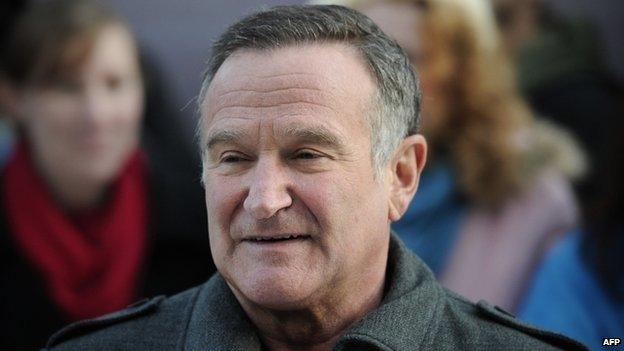
Police said Robin Williams was found dead at his California home on Monday, having taken his own life
The death of US actor and comedian Robin Williams has prompted a debate about the way suicide is reported in the media.
Following Williams' death on Monday, Samaritans emailed media organisations, external "strongly advising them" to follow the charity's guidelines on the reporting of suicide, external.
In particular, the charity urged editors to "be mindful that celebrity suicides have a higher risk of encouraging copycat behaviour".
In 2008, the World Health Organization concluded, external: "Vulnerable individuals may be influenced to engage in imitative behaviours by reports of suicide, particularly if the coverage is extensive, prominent, sensationalist and/or explicitly describes the method of suicide."
But it also observed that "responsible reporting may serve to educate the public about suicide and may encourage those at risk of suicide to seek help".
'Simplistic reasons'
Guidelines from Samaritans, the Press Complaints Commission's editors' code of practice, external, the Ofcom broadcasting code, external and the BBC's editorial guidelines all also advise against going into detail about the methods used.

Williams, centre, won an Oscar for his role in Good Will Hunting
Now Samaritans has complained about "excessive detail" in some of Wednesday's national newspapers about how Robin Williams took his own life.
"The media has come a long way over the past few years in terms of sensitively reporting suicide, which is why we are concerned to see that there have been a large number of articles detailing unnecessary information about the nature of Robin Williams' death," it said in a statement.
"We are taking steps to address our concerns," it added.
'Disappointing headlines'
Despite this, Samaritans' Sal Lalji told the BBC News website: "I'm pleased to say that, generally, we don't see too many articles that we consider to have excessive detail.
"But often we'll see lots of stories with simplistic reasons for why a person might take their own lives."
Samaritans says over-simplification of the causes of suicide can be misleading and is unlikely to reflect accurately the complexity of suicide.
"Our advice would be talk about the wider issues, like mental health issues or the complex nature of suicide," adds Ms Lalji.

Excerpts from the BBC editorial guidelines
Suicide, attempted suicide and self-harm should be portrayed with great sensitivity, whether in drama or in factual programmes
Factual reporting and fictional portrayal of suicide, attempted suicide and self-harm have the potential to make such actions appear possible, and even appropriate, to the vulnerable
Care must be taken to avoid describing or showing suicide or self-harming methods in explicit detail, unless there is a clear editorial justification
The sensitive use of language is also important. Suicide was decriminalised in 1961 and since then the use of the term "commit" is considered offensive by some people

'Reduce stigma'
The Samaritans guidelines, first published in 1994, also suggest care over language, advising, for example, against the term "commit suicide" because it could imply a criminal action.
Mental health charity Mind says it is "disappointed by reporting and headlines in many of today's newspapers which contravene good practice set out by Samaritans guidance and Mind's own advice".
But the charity's chief executive Paul Farmer also said "some media coverage has been sensitive", adding this could "prompt people to seek the support they need as well as help to reduce the stigma around mental health problems".
The way some papers reported that Williams took his own life and speculation about the reasons for doing so have prompted a strong reaction on Twitter:
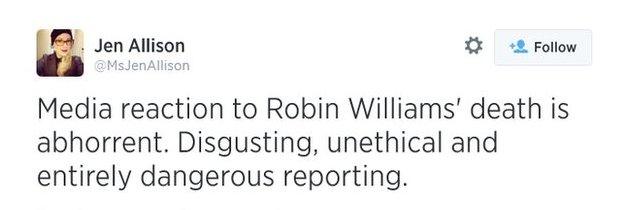
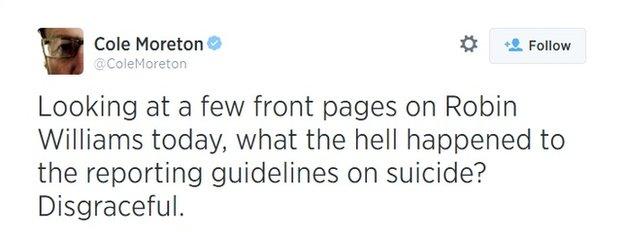
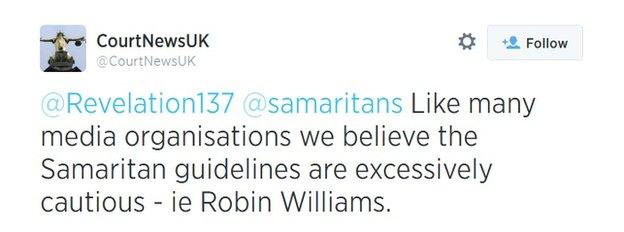
'Real problem'
Journalist and media commentator Mary Hamilton, who has blogged about Wednesday's newspaper coverage, external, says some papers "don't care about the guidelines".
She says she has read "a lot of detail reporting on exactly how Robin Williams killed himself and what method he used".
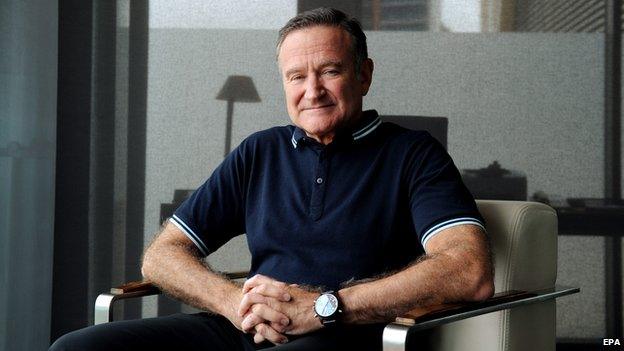
Williams was famous for films such as Good Morning Vietnam and Dead Poets Society
"It's obviously a real problem when you are essentially giving people the information they need to act on suicidal ideations." [Suicidal ideation is a term sometimes used to mean being preoccupied with suicide.]
She adds: "You've also at the same time got these big front pages very strongly implying that he killed himself because he had money problems.
"And there are quite a lot of people in the UK with mental health issues and money problems right now.
"What that kind of reporting does, in a very insidious way, is imply that there is a solution to money problems - and it's killing yourself."
Grief 'intrusion'
Bob Satchwell, executive director of the Society of Editors, meanwhile, says suicide is "always a difficult issue" to report.
He says holding back precise details to avoid "copycat" suicides is key, adding: "All journalists understand that.
"Secondly, there is the intrusion into grief.
"We've worked very closely over the years with the Samaritans and other organisations about reporting suicide and looked at it very, very carefully.
"Obviously, there's been huge coverage of this case because he was a famous actor and a funny man and he made people laugh.
"I think most of the reporting I've seen has been very responsible and careful, bearing in mind that there's a huge amount of interest from the public.
"That's why the papers have devoted a lot of space to it - as have broadcasters."
He adds: "I've not personally seen anything which made me concerned about it.
"In fact, I think there's a lot of sympathy."
- Published13 August 2014

- Published13 August 2014
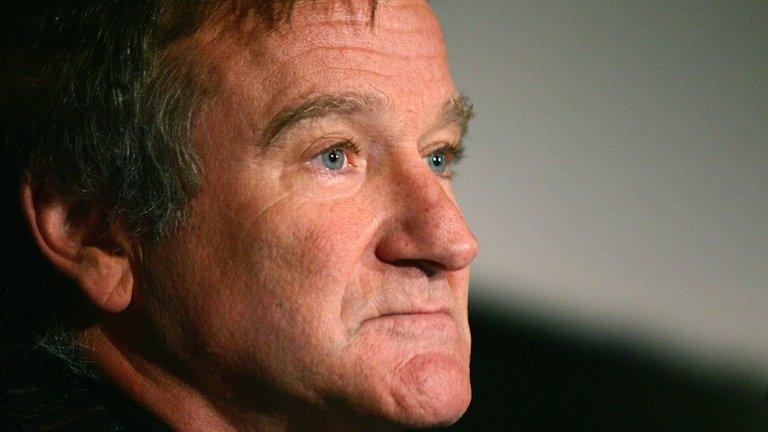
- Published12 August 2014

- Published12 August 2014
